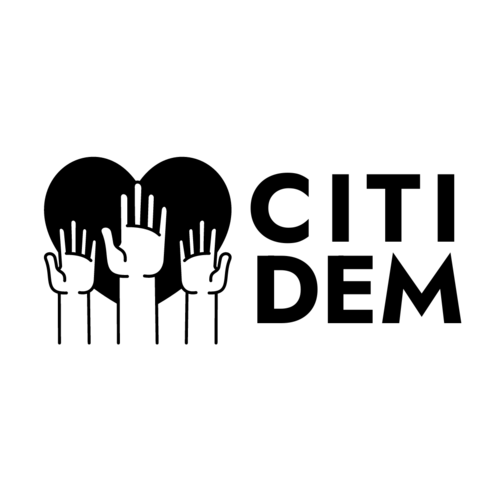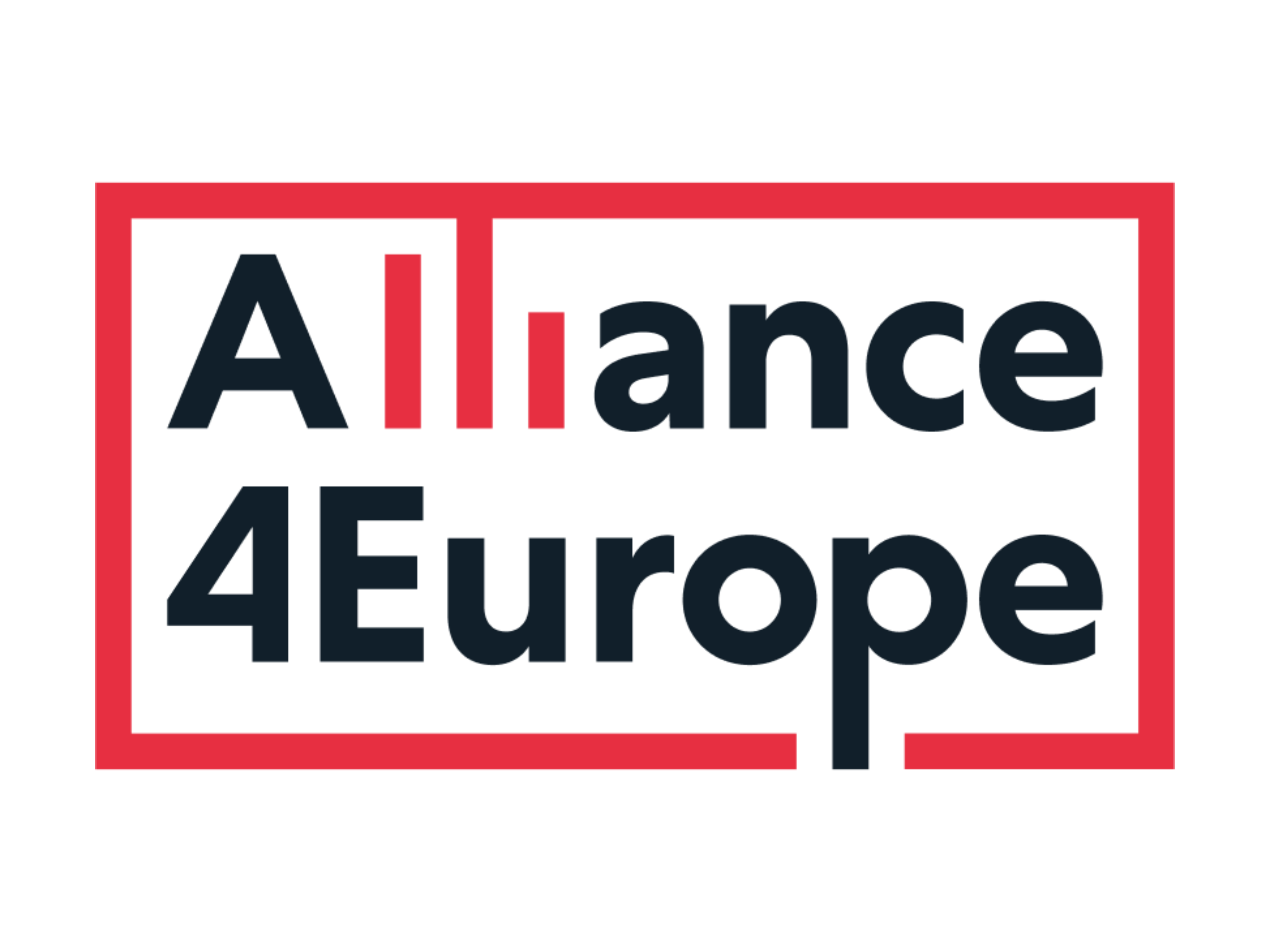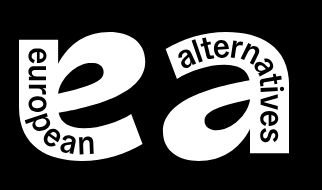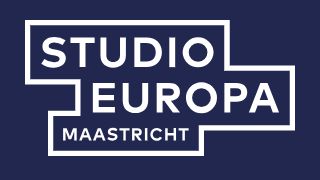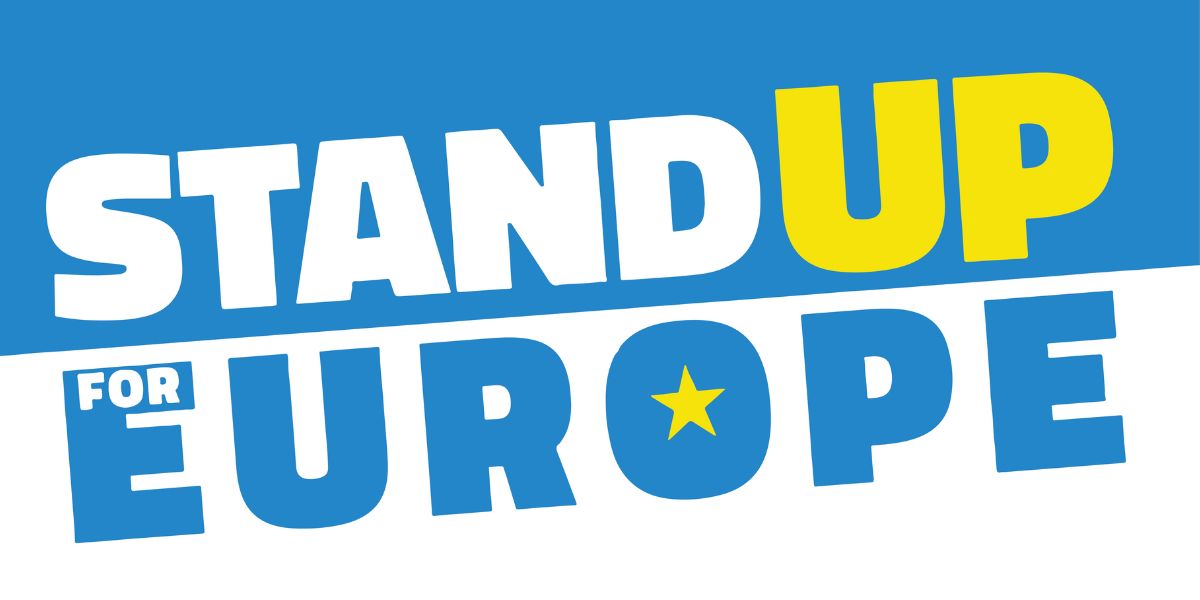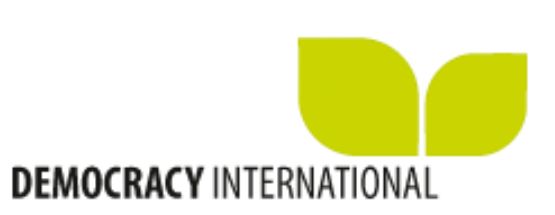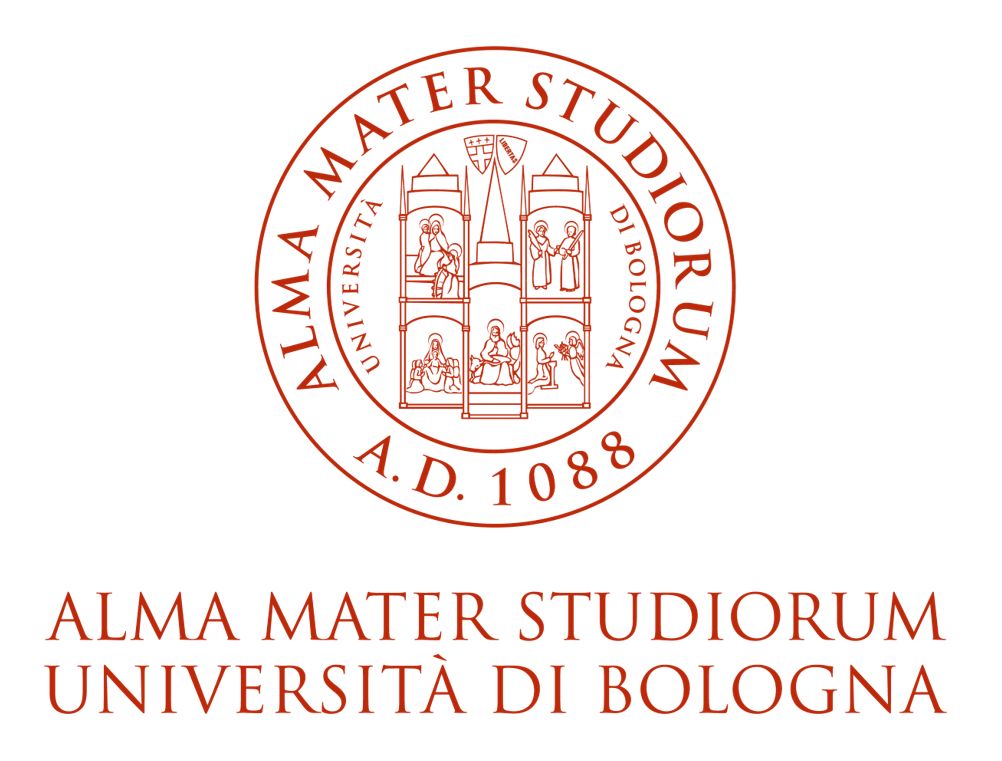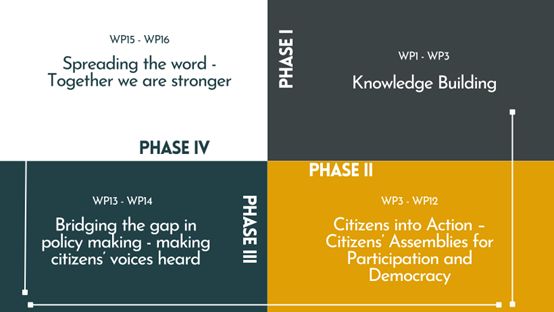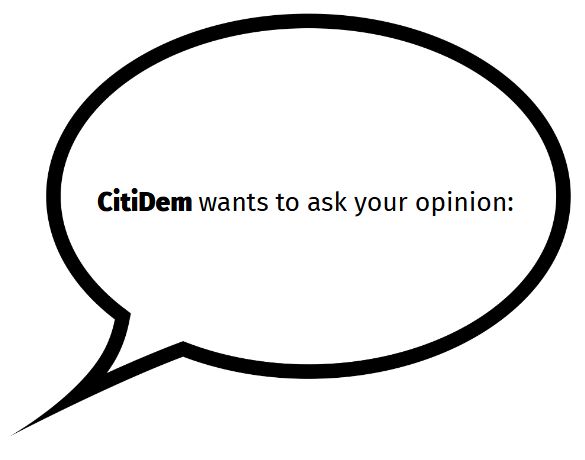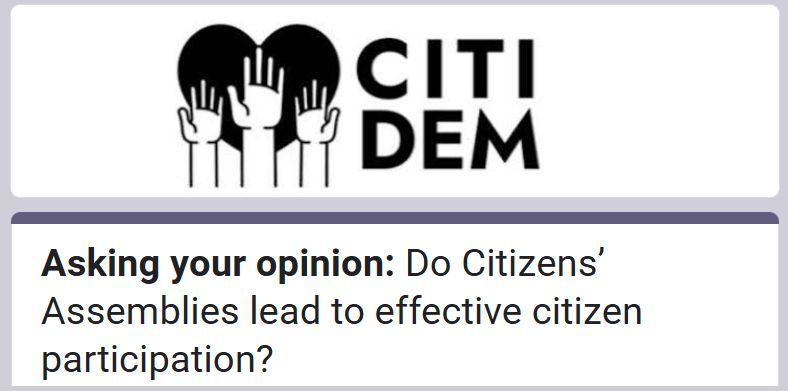Events
4 March, 2026: Webinar – Mini-publics, citizen washing, and AI
In our seventh webinar, we will discuss the use of deliberative mini-publics in European politics and ask whether European deliberative events have helped to empower European citizens, enhance the EU’s democratic legitimacy, and to promote democratic innovation. We will also ask the ‘hot’ question of the role of digital technology and AI in deliberative practices, and whether digital tools help to strengthen democracy and fix its troubles, or rather fail to address democracy’s most urgent problems.
Speaker: Alvaro Oleart, postdoctoral researcher at the Department of Political Science and Institute for European Studies of the Université Libre de Bruxelles.
Registration: https://shorturl.at/Vl8vf
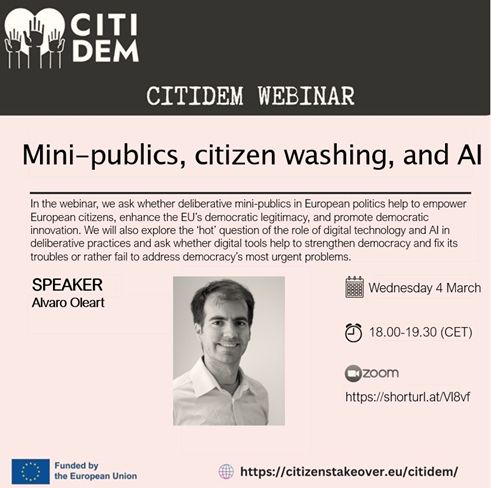
29 January, 2026: CitiDem Webinar “Deliberating with Diablo”
In this webinar, we will discuss with professors André Bächtiger and John Dryzek on how to deliberate with “diablo”. In times of democratic crisis and looming authoritarianism, how can deliberative democracy help to reduce the impact of dishonest and manipulative communication? André Bächtiger and John Dryzek will discuss these matters on the basis of their recent book (2024), Deliberative democracy for diabolical times (Cambridge University Press) and (2025), ’Deliberating with Diablo: How to Confront the Crisis of Political Communication and Help Save Democracy’ in: Political Studies Review.
Thursday 29 January, 2026, 9.00-10.30am (Central European Time) – 7.00-8.30pm (Australian Central Standard).
Registration:
https://shorturl.at/Gw7xw
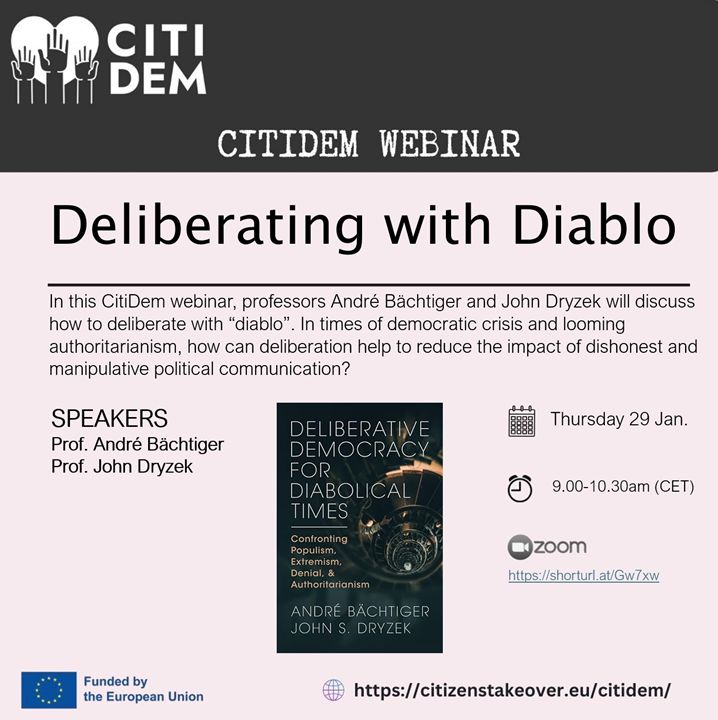
Speakers
Prof. André Bächtiger is professor of Political Theory and Empirical Democracy Research at the University of Stuttgart.
Prof. John Dryzek is Distinguished Professor and former Australian Research Council Laureate Fellow in the Centre for Deliberative Democracy and Global Governance at the University of Canberra.
3 December, 2025: CitiDem Webinar “The Magical Idea of Citizens’ Assmblies”
In this webinar, we discuss the ‘magic promise’ of deliberative citizen engagement and try to understand what makes the idea so seductive. In the webinar, John Boswell will help to unpack how the magic works, in relation to citizens’ appeal for participation, stimulating feelings of empowerment, and enhancing resonance with politicians and institutions. The webinar will provide important insights into the subtle dynamics of citizen deliberation and help understanding its wonders (in a realistic fashion).
Speaker
John Boswell is Professor of Politics and Public Policy at the University of Southampton, UK.
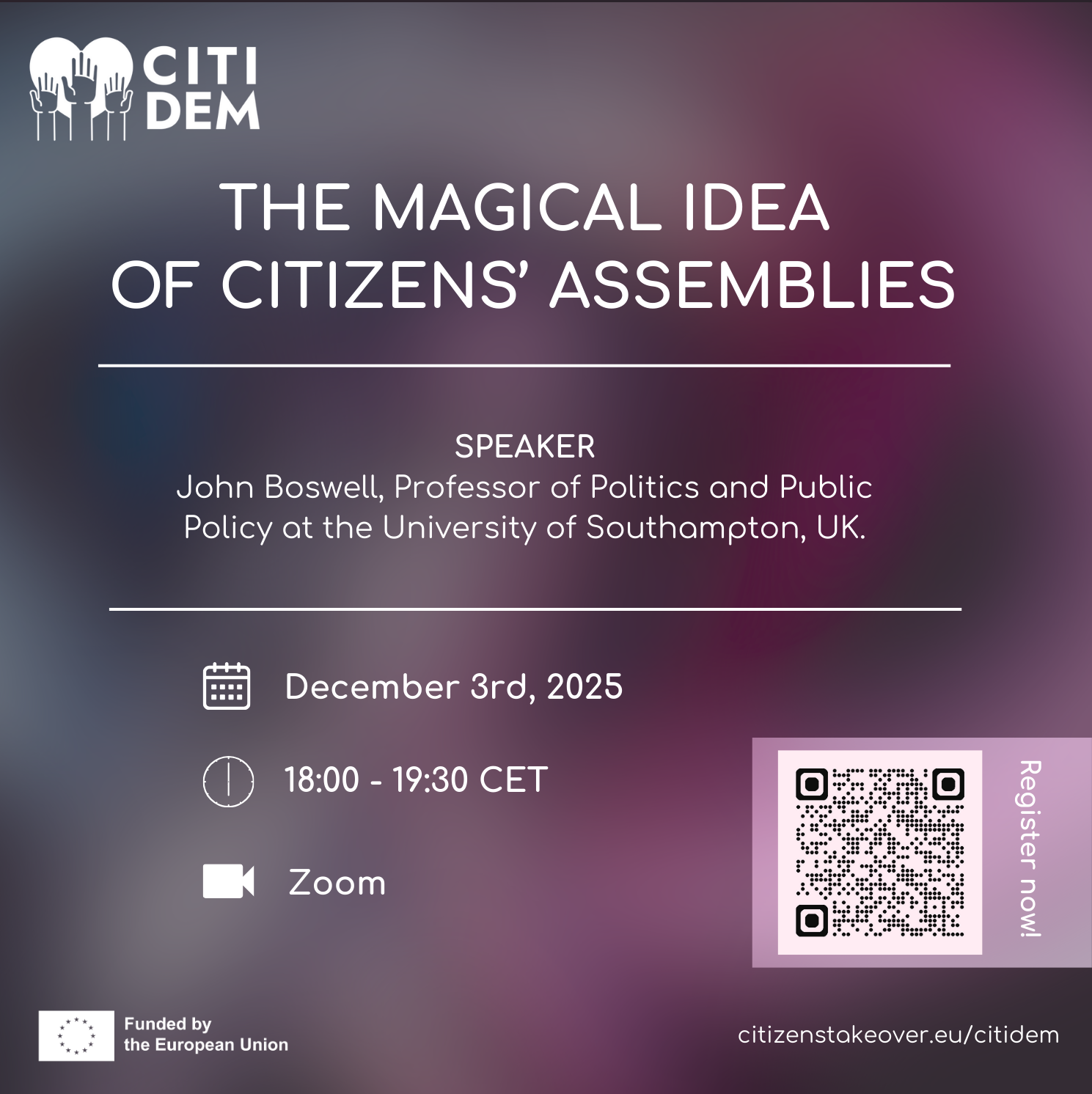
20 November 2025: Citizen Assembly on the Political Participation of Migrants in Slovenia “Political Participation for All – Towards a Europe of Equals”
The Peace Institute is organizing a Citizen Assembly on the political participation of migrants in Slovenia, which will be held on Thursday, 20th November, 16.00-20.00, at CoFestival, Kino Šiška, Ljubljana. Recognizing that a truly democratic society depends on the active engagement and equal rights of all its members, this event will explore the opportunities for migrants to participate politically and be fully integrated into society.
In Slovenia, the political participation of migrants has been partially addressed through amendments to key legislation. The 2002 revision of the 1993 Local Elections Act granted the right to vote in local elections to foreigners with permanent residence—but excluded those with temporary residence or those seeking asylum. Meanwhile, the 1994 Political Parties Act was amended to allow EU citizens to join Slovenian political parties, but still excludes most other foreigners, such as citizens of former Yugoslav republics, who represent a significant portion of Slovenia’s migrant population.
There are a few promising initiatives at the local level. Some municipalities—such as Idrija, Postojna, and Trbovlje—have started experimenting with Migrant Advisory Boards, and the City of Ljubljana has established a Working Group for the creation of such a board. Nevertheless, migrants and their representatives remain severely underrepresented in public bodies, political parties, and civic initiatives at the local, regional, and national levels.
We invite all interested citizens and non-citizens, NGOs, civil society representatives, local authorities, and anyone else who wishes to contribute their thoughts and experiences.
Additional information can be found via the Peach Institute website – available here!
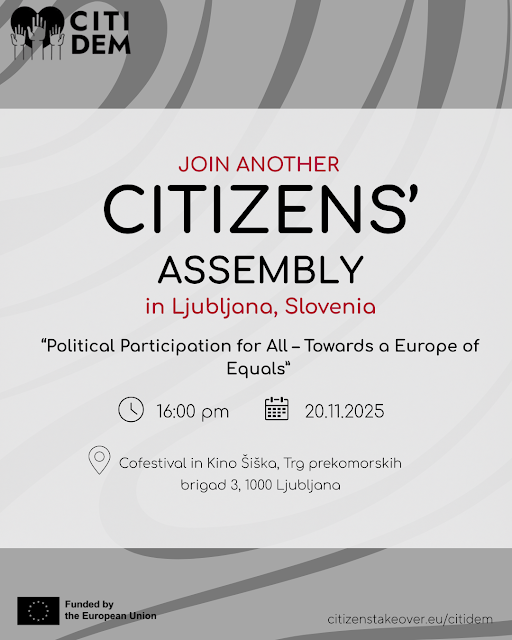
12 June 2025: Citizen Assembly on the Political Participation of Migrants in Slovenia
“Political Participation for All – Towards a Europe of Equals”
Thursday, 12 June at 15.30
African Village Festival, Špica, Ljubljana
The Peace Institute is organizing a Citizen Assembly on the political participation of migrants in Slovenia. Recognizing that a truly democratic society depends on the active engagement and equal rights of all its members, this event will explore the opportunities for migrants to participate politically and be fully integrated into society.
The assembly will focus on three key areas:
- Education and Awareness: Raising awareness among local, regional, national, and EU authorities about the value of migrant participation. Promoting policies that recognize and encourage the active involvement of migrants in public bodies related to integration, diversity, and inclusion.
- Trust and Engagement: Building trust between migrant communities and public authorities, while fostering stronger cooperation across all levels of government.
- Improving Integration: Enhancing integration programs—especially in the areas of housing, employment, language education, political education, and civic participation. This also includes better financial support for migrant organizations and their media outlets.
5 – 8 June, 2025: Transeuropa Festival – Greater Paris
The TRANSEUROPA Festival 2025: Margins on Fire, organised by European Alternatives. The festival aims at gathering Transeuropean feminists to contribute to the building of a common front against the rise of anti-gender movements. The Festival is a cultural, political and artistic event. It is also geared towards building personal relationships among participants, peer-learning and strength, by sharing ideas, knowledge, building the path for common actions and sharing moments of celebration and joy.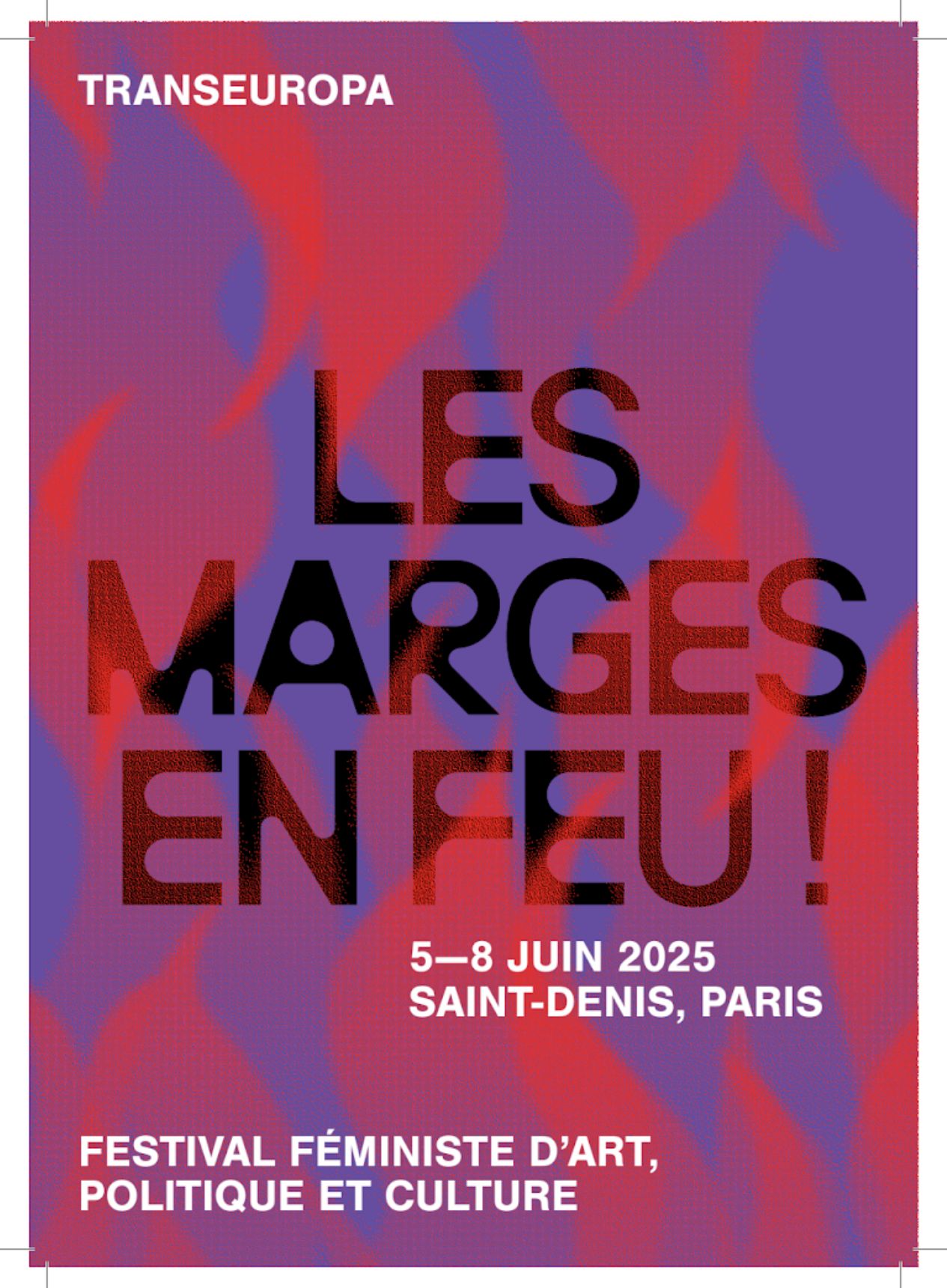
5 May 2025: Citidem Workshop Online Civic Education
Join the CitiDem Workshop: Online Civic Education Programme for Citizens and gain valuable insights into participatory democracy.
Learn from experts, engage in discussions, and discover practical tools to make a real impact.
May 5th, 2025 – 16:00 – 18:00 CET – ZOOM
30 April 2025: Webinar Citizens’ Assemblies and Militant Democracy
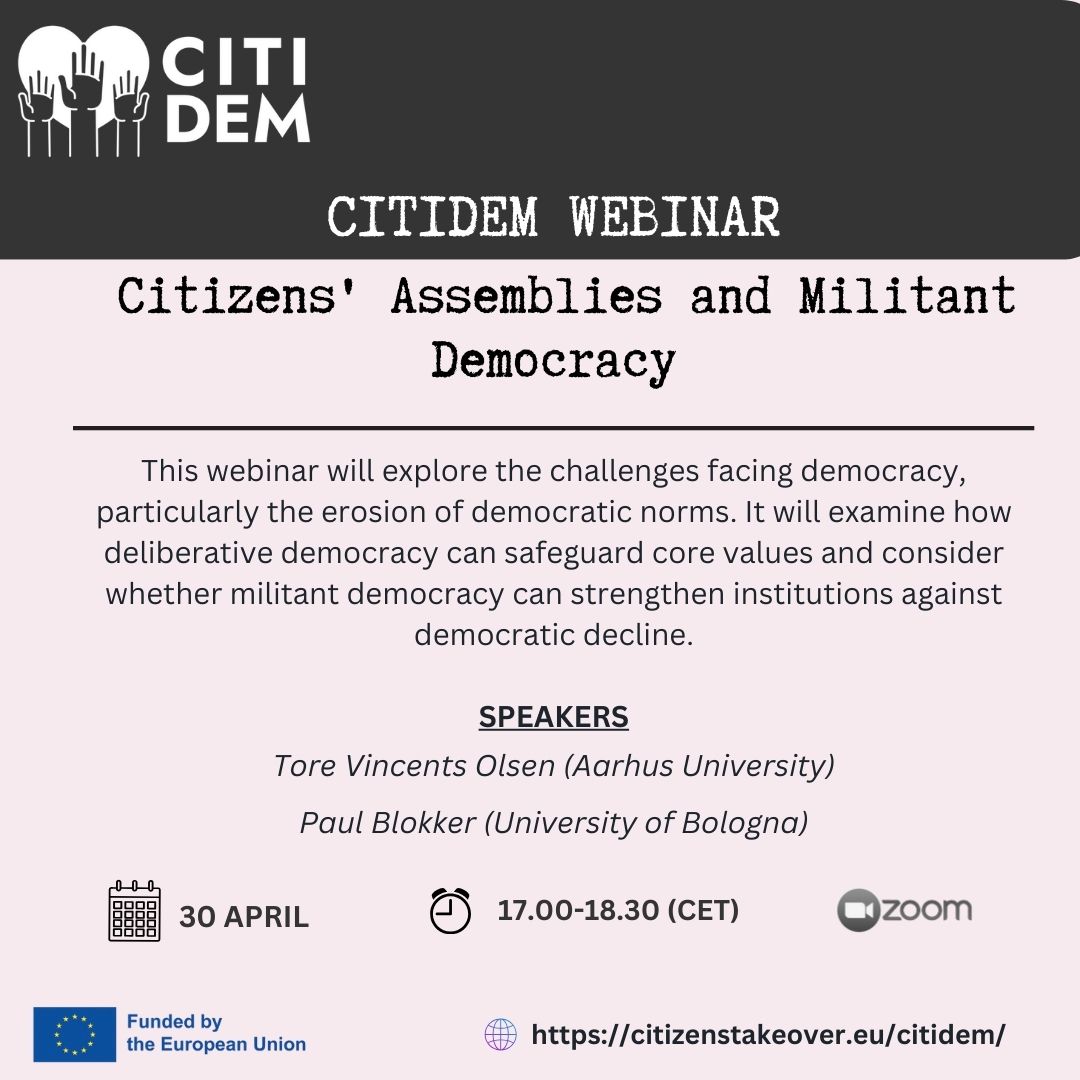
Wednesday April 30, 2025 17.00-18.30 (CET)
The fourth webinar of the Citizens’ Action for Democracy – CitiDem project, will discuss Deliberative Democracy in relation to Militant Democracy.
Democracy is facing strong headwinds, not least due to actors increasingly ignoring basic democratic rules, norms, and practices. This webinar will reflect on how democratic innovation, in particular in the form of deliberative democracy, can best defend core democratic values and practices. A main question will be to what extent a form of militant democracy can help to counter democratic erosion and to build more robust democratic institutions and practices.
Militant democracy will be discussed by profs. Tore Vincents Olsen, Aarhus University, and Paul Blokker, University of Bologna.
Please register here.
16 April 2025: Webinar Populism and Citizens’ Assemblies
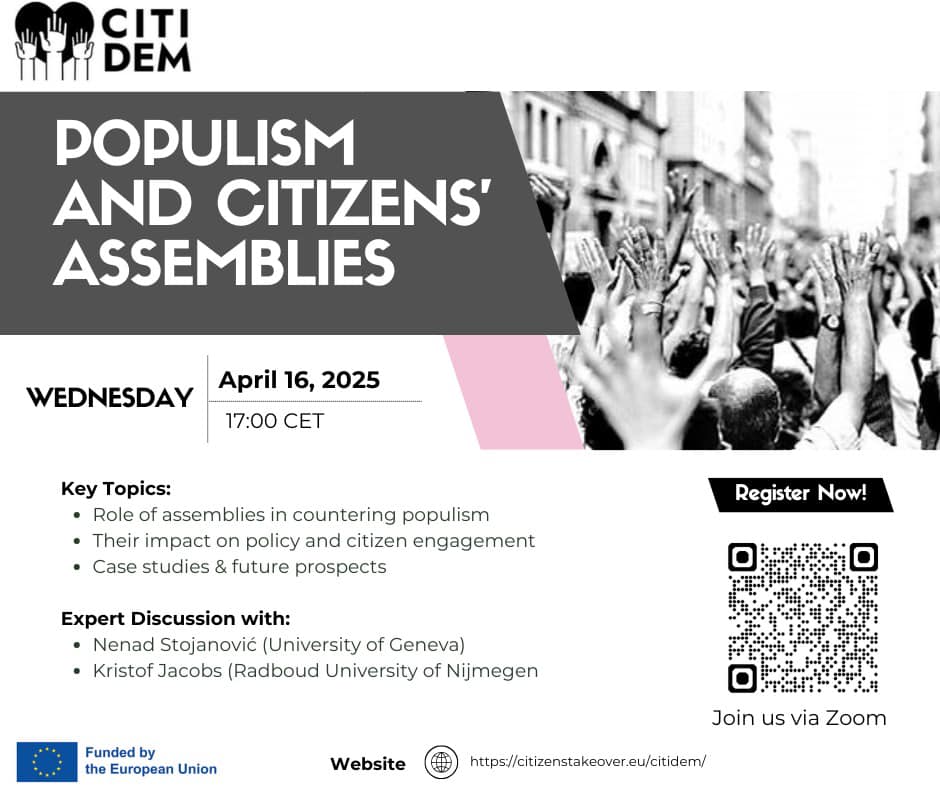
CitiDem webinar on Populism and Citizens’ Assemblies, 16 April, 2025 (5-6.30pm CET). We will discuss citizens’ assemblies in times of populism and authoritarianism, with profs. Nenad Stojanović and Kristof Jacobs.
NB. On 30 april, there will be a follow-up event on “Deliberative and militant democracy”, with prof. Tore Vincents Olsen.
Please register here: https://unibo.zoom.us/meeting/register/dtbXVC7ETHWF5HGygz3q5A#/registration.
17 March 2025: Book seminar/webinar (Università di Bologna)
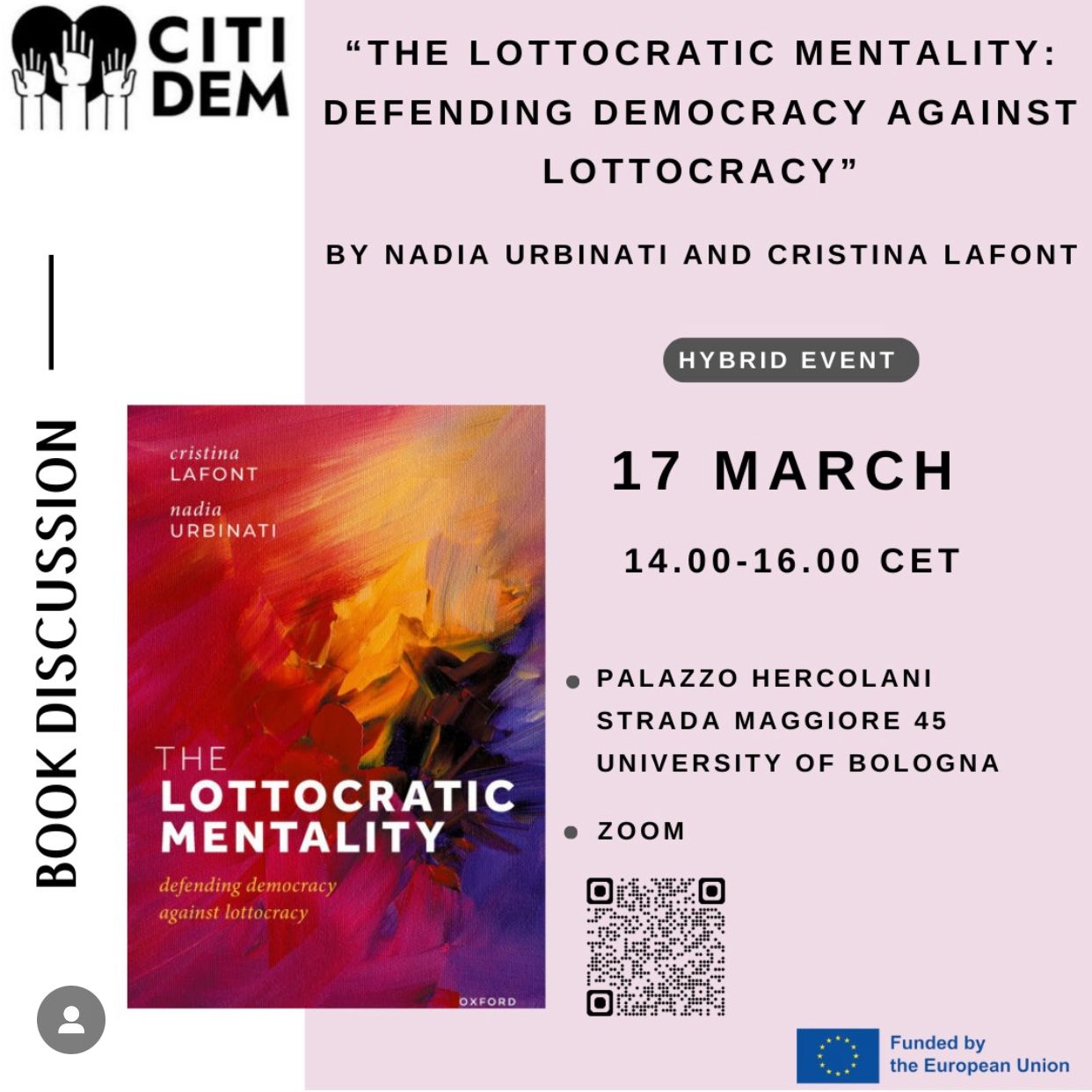
Book seminar – Nadia Urbinati, The Lottocratic Mentality: Defending Democracy against Lottocracy, Oxford University Press (2024, with Cristina Lafont).
Monday 17 March, 14.00-16.00 (CET), Department of Sociology and Business Law (SDE), Palazzo Hercolani, Strada Maggiore 45, Bologna. In-person and online event.
Nadia Urbinati – Kyriakos Tsakopoulos Professor of Political Theory at the Department of Political Science at Columbia University, NYC – and Cristina Lafont – Harold H. and Virginia Anderson Professor of Philosophy at Northwestern University -, will present their recent book, The Lottocratic Mentality: Defending Democracy against Lottocracy (2024, Oxford University Press).
The book will subsequently be discussed by Elisabeth Alber (EURAC, Bolzano), Silvia Suteu (EUI), Yves Sintomer (University Paris 8), Michele Fiorillo (Scuola Normale Superiore, Pisa), and Paul Blokker (UniBo), to be followed by a public debate.
The event is organised in the context of the CERV project Citizen Action for Democracy (CitiDem), coordinated by prof. Paul Blokker (University of Bologna/SDE).
Registration for event on Zoom: https://unibo.zoom.us/meeting/register/JrbFJ6vFSXi6XPT4inzDKA.
7-8 March 2025: European Citizens’ Assembly (Eumans)
European Citizens’ Assembly – “How can we boost citizens’ rights in the European Union?”
Eumans is excited to invite you to participate in a groundbreaking event: a Citizens’ Assembly on democratic innovation and how it can be used by social movements to push for rights affirmation.
If you’re interested in being part of this transformative experience, please fill in the form . Participants will be selected by sortition and notified with further details. This will be the CITIDEM Project’s Transnational Citizens’ Assembly on European Democracy Reform. This unique gathering will take place on March 7-8, 2025, at the Université Libre de Bruxelles.
Why Your Participation Matters
As a citizen of Europe, your voice is crucial in shaping the future of our democratic processes. This assembly aims to explore how we can effectively advocate for citizens’ rights through democratic innovation, using the case of abortion rights and its as a starting point for broader discussions.
What to Expect
–> Day 1 (March 7): An informative session for all 100 participants, featuring:
– Expert presentations on direct action rights and deliberative democracy tools
– Insights from committees and associations on current proposals
– A unique opportunity to co-design a democratic innovation process
–> Day 2 (March 8): A deliberative session for 50 randomly selected participants, focusing on:
– Developing concrete recommendations for European democracy reform
– Exploring innovative tools for citizen participation
– Crafting a blueprint for deliberative advocacy actions
17 February 2025: Webinar (Università di Bologna)
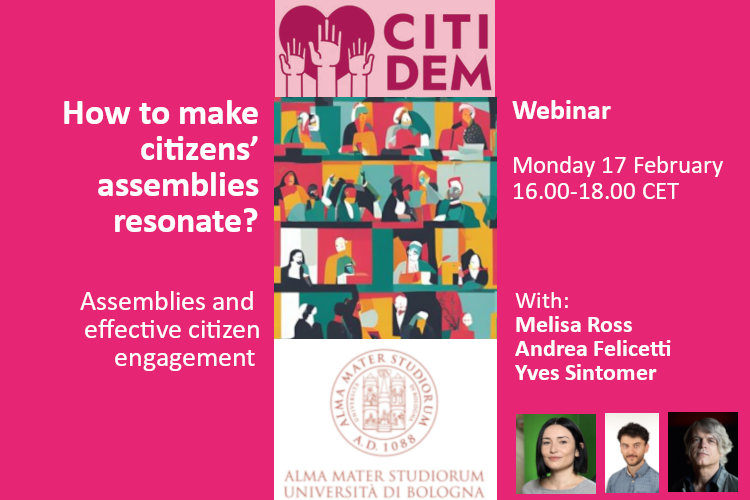
The first CitiDem event will be a webinar on How to make citizens’ assemblies resonate?, held on Monday 17 February, 16.00-18.00 CET, and organised by the University of Bologna. The webinar wants to discuss the question of how effective citizens’ assemblies are in actively involving citizens. In times of increased distrust towards democratic politics, may assemblies help to bring citizens closer to democratic politics? If so, what kind of citizens tend to participate more? And what kind of methodologies work best in engaging citizens? And which types of assemblies work best? The webinar will further engage with the question of whether assemblies should be linked to other forms of engagement, and if and when participation in assemblies tends to lead to more durable forms of citizens’ engagement and activism. We have invited three scholars with great expertise on citizens’ assemblies – Melisa Ross (University of Bremen), Andrea Felicetti (University of Padova), and Yves Sintomer (University of Paris 8) – to discuss how we can make sure that assemblies engage citizens in a meaningful and empowering way.
If you want to participate, please register here (Zoom).




